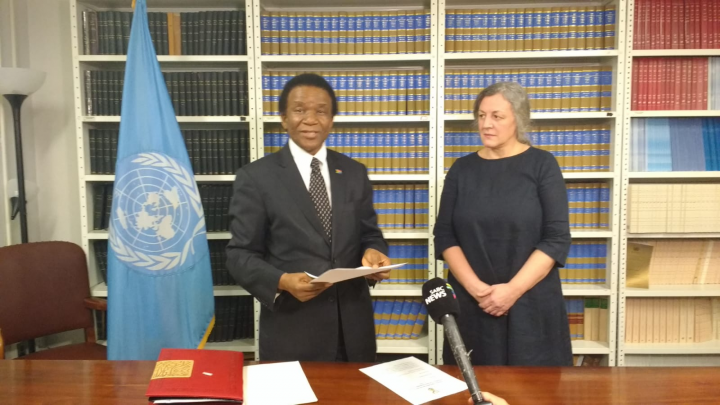Today, the only country that went from developing its own nuclear arsenal to dismantling it and being an outspoken advocate against these weapons of mass destruction, took another critical step towards a nuclear-weapons-free-world: in the halls of the UN HQ in New York, South Africa just ratified the UN Treaty on the Prohibition of Nuclear Weapons (TPNW).
ICAN welcomes South Africa’s continued leadership on nuclear disarmament and hopes its action will inspire other African nations to adhere to the Treaty. As a continent, Africa has historically taken a strong position against nuclear weapons; now individual countries have a unique opportunity to make a significant impact towards the rapid entry into force of The Nuclear Ban Treaty.
A quick history of South Africa’s Nuclear weapons
South Africa’s ratification of the TPNW is unique, because of its own history with nuclear weapons. As early as 1948, uranium-rich South Africa was interested in atomic energy, and the mining, trade and energy industry that could be built around it. The government bought its first reactor from the US in 1957.
While officially the purpose of the nuclear explosion program did not change from peaceful to military purposes until 1977, US intelligence reports show that South Africa formally began its nuclear weapons program in 1973. Initially, heavy international pressure kept them from testing these weapons. But by 1982, South Africa had developed and built its first nuclear explosive device . By 1989, South Africa had 6 bombs, each containing 55kg of Highly Enriched Uranium (HEU), capable of delivering an explosive equivalent of 19 kilotons of TNT.
Read more about South Africa’s nuclear weapons programme at NTI >>
From nuclear-armed state to disarmament champion
In 1989, the government officially ended the nuclear program, and South Africa joined the Non-Proliferation Treaty (NPT) as a non-nuclear-weapon state in 1991. By 1994, the IAEA confirmed that all of South Africa’s nuclear weapons had been dismantled.
South Africa has been a champion for a world without nuclear weapons ever since. In 1996, they joined other African nations in declaring Africa a nuclear-weapons-free zone through the Treaty of Pelindaba, named after South Africa’s old research facility. The African Commission on Nuclear Energy (AFCONE) – established for the purpose of ensuring States Parties’ compliance with their undertakings in the Treaty – is based in Pretoria. In 1999, they adhered to the Comprehensive Nuclear Test Ban Treaty (CTBT).
A 1998 address to the UN General Assembly by President Nelson Mandela illustrates the ways in which South Africa challenged the arguments of deterrence used by other nuclear-armed nations:
“We must ask the question, which might sound naive to those who have elaborated sophisticated arguments to justify their refusal to eliminate these terrible and terrifying weapons of mass destruction – why do they need them anyway!
“In reality, no rational answer can be advanced to explain in a satisfactory manner what, in the end, is the consequence of Cold War inertia and an attachment to the use of the threat of brute force, to assert the primacy of some States over others.”
In the following years, South Africa continued to stand firmly behind the principle of nuclear disarmament, and became part of a core group of countries pushing the humanitarian initiative to end nuclear weapons since 2012. That initiative grew into a movement for a UN treaty banning nuclear weapons, which led to the adoption of the UN Treaty on the Prohibition of Nuclear Weapons (TPNW) on July 7th, 2017. South Africa signed the Treaty on the day it opened for signature, and will now become the 22nd party.
“As a country that voluntarily dismantled its nuclear weapons programme, South Africa is of the firm view that there are no safe hands for weapons of mass destruction […] We are making a clarion call to all member states of the UN to sign and ratify the ban treaty in order to rid the world and humanity of these lethal weapons of mass destruction.” – Jacob Zuma, September 2017, signing ceremony of the TPNW
At ICAN, we welcome and celebrate this ratification and encourage South Africa to maintain its leading role in the global efforts to achieve nuclear disarmament.






